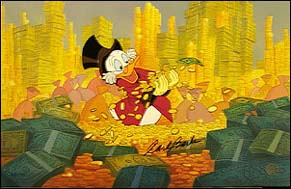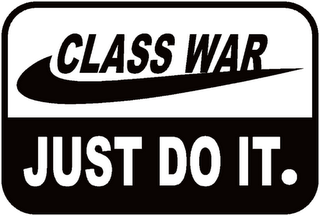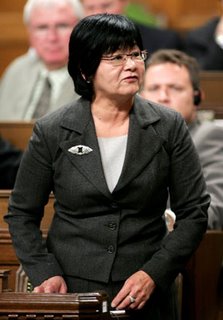
With the recent debate on the Wheat Board there has been a focus in Federal politics on Western Farmers. The farmers movement in Western Canada influenced politics in Canada both left and right for the past ninty years and still is.
It is the politics of producerism. It's populism is deeply political, and its producerism is the source of its critique of the capitlaist monopoly marketplace.
When it is used by the right wing such as the Reform party, it is used as an attack on state monopolies. When used by Social Credit it was the monopoly of the banks. When used by the left such as the CCF it was an attack on monopoly captialism and its state.
The Prairie Roots of Canada's Political 'Third Parties'
Farmers' organizations were also thinking seriously about new political departures. When the "Union Government" from 1917-1920 failed to make significant changes to the tariff structure, many farmers decided to give up on the old parties.
Some political activists on the prairies believed that political parties were inherently undemocratic, and that they should be replaced by non-partisan political organizations. Even if not solidly "anti-party," many western political activists were determined to break the mold of previous party practice.
As grain farmers made up the largest single occupational group on the prairies, provincial grain grower associations and co-operatives made up the major interest groups who dealt with provincial and federal governments. So when organized farmers in Alberta, Manitoba and Saskatchewan followed the United Farmers of Ontario by "going political" between 1920 and 1922, potent political forces ready to replace old party government were suddenly on the scene.
Farmers' parties were able to mobilize citizen opinion concerning public ownership of banks and resources, re-design of political institutions, and other reform measures. Under pressure from the "Non-Partisan League," the United Farmers of Alberta organization (UFA) developed the most radical and distinctive critique of old-party politics, and a new theory for political representation. Farmers' organizations of other western provinces were less innovative but nonetheless succeeded in laying the foundations for third party politics.
Prairie farmers regularly attacked the National Policy, especially the protective tariff. In 1921, the Canadian Council of Agriculture's "Farmers' Platform" observed that the tariff was "a chief corrupting influence in our national life because the protected interests, in order to maintain their unjust privileges, have contributed lavishly to political and campaign funds, thus encouraging both parties to look to them for support, thereby lowering the standard of public morality."
The originators of this Western Populism and Producerism were William Irvine who would co found the CCF and Henry Wise Wood the ideolouge behind the United Farmers of Alberta movement.
Farmers not only reinforced, but they also criticized the rural socio-economic order, as they often expounded a radical, "populist" discourse that exposed the material inequalities inherent in monopoly capitalism. Drawing on populist traditions of castigating corporate, political, and social privilege, this particular strain of radical agrarianism at once embraced and critiqued the concept of producerism, or the labour theory of value. This vision of society held that the producing class, made up of farmers and skilled workers, needed to band together to defeat monopoly and corporate power to retain the fruits of their labour for themselves. Even though this socio-economic outlook encountered many adherents in both the Grange and Patrons of Husbandry, it tended to exhibit a more negative view of other classes in the larger community. Dividing society into either useful producers or slothful and parasitical non-producers, some members of the Dominion Grange and the Patrons of Industry fostered adversarial sentiments within the less prosperous members of the agricultural population, focusing on issues of their material, political, and even social exclusion. However, what is noteworthy regarding this antagonistic class rhetoric of agrarian protest is that farmers advocating the continuance of market agriculture and those supporting the co-operative system could both maintain hostile relations with those individuals deemed non-producers. "Severing the Connections in a Complex Community": The Grange, the Patrons of Industry and the Construction/Contestation of a Late 19th-Century Agrarian Identity in Ontario
While monopoly especially by banks and railroads were the main focus of producerist outrage its populism could easily become the hatred of the 'other' as much as critique of the capitalist banker, landlord, railbaron. That other was the loafer. And thus the rural revolt in Western Canada, the source of our 'alienation' as a colony of Ontario and the Railroads, was as much against the metropole as it was against colonialism by "lazy-faire capitialists".
"The Business Clerk as Social Revolutionary; or,The producerist/populist ideology of Prairie farmers, is a contiental North America phenomena.
a Labor History of the Nonproducing
Classes"
In fact, the age abounded in loafers. There were literary loafers, Yankee loafers,
French loafers, genteel loafers, common loafers, and country loafers, among others, the
latter observed by Nathaniel Hawthorne at the Brighton Cattle Fair “wait[ing] for some
friend to invite them to drink.” Nevertheless, loaferism was most essentially a metropolitan
phenomenon, haunting the city’s sidewalks, wharves, museums, and parks, and serving as a
ready epithet for anyone needing to hurl an insult. The young New York conservative
George Templeton Strong thus ascribed the worst tendencies of democracy, “so called,” to
the loafer, while the Southern Literary Messenger accused him of no less than advocating
“the sublime doctrine of social equality.” Loafers were known for cursing without shame
and for smoking cigars. They cared little for the law and exhibited a marked disregard for
public life in general. They were eccentric, if not impudent, in their personal habits. They
had a weakness for billiards and bar-rooms and were maddeningly self-satisfied, if not
philosophically reclusive. And they wore stand up collars that were, more often than not,
covered in stains.
A COMPARATIVE VIEW OF POPULISM ACROSS TIME AND SPACE:
Fertile fields, indeed, for social movements of the type that Tilly described: modern, organized, and sustained efforts on behalf of people who consider themselves powerless to shape their own future, movements that are political in intent but not confined to political parties. What we have seen emerging since the 1970s are cross-class movements, for the most part, tending to be centered in the lower middle class, but still comprised of people who consider themselves to be “producers” (though now their self-identity may include equal parts of “consumer”), and possessing as a birthright sufficient cultural resources to organize themselves for action. For a variety of reasons most have come to view government as the principal threat to their liberty and economic well-being and to express that feeling with as much intensity as “my” populists ever did against the monopolists.
I believe that Tilly points us toward the kind of framework needed to analyze “populist” movements of the past quarter century as a class of collective behavior, not merely a language or generalized sense of resentment. Modern day movements of this type are organized and sustained activities that bring forward programs of “reform” on behalf of “the people.” They make use of cultural resources at hand, even while harboring deep suspicion of dominant cultural institutions. They connect, in some way, to constitutional and democratic processes. While they often have strong leaders they cannot be understood solely in terms of the leader’s ability to sway the impressionable masses.
In this way of looking at the phenomenon in America, groups that are “off the grid”
When producerists support a market place alternative to cooperatives like the Wheat Pools and the Wheat Board, though the later is state sanctioned, it is not the current capitalist marketplace they long for. It is the idealized 'free market'.
"Raising Less Corn, More Hell"In the course of three decades as a newspaper writer, Pyle went from feeling that the "farm beat" was like covering the progress of a glacier to understanding that the real story of agriculture in America is quite dramatic. In Pyle's view, our farming culture is based on one big bad idea and one big fat lie.
"The bad idea," he writes, "is the increasing concentration -- economic, political, and genetic -- of the ways in which our food is produced." The lie behind it is that "the world is either short of food or risks being short of food in the near future." With the help of an editorial writers' fellowship, and later as the director of the Prairie Writers Circle at the Land Institute in Salina, Kansas, Pyle took time away from his daily deadlines to research a book on the American farm economy.
"Raising Less Corn, More Hell" is dedicated to the memory of his father, who was raised on a Kansas farm, but Pyle is no sentimentalist when it comes to the fate of family farms. What the agricultural economy needs, he argues, is a truly free market -- not one kept afloat by federal subsidies and unaccounted environmental damage. The root cause of hunger, he claims, is usually a lack of money. Yet the fear of not having enough food has driven the rise of chemical fertilizers, massive machinery, genetically modified seed, and whatever else will help squeeze greater yields out of every acre.
Meanwhile, the true costs of the industrial system -- eroded soil and depleted aquifers, polluted water and air, desperate and indebted farmers, rundown main streets, unhealthy diets, and a food supply at risk - are not factored into the price of food.
Even as we push to grow more, the government subsidizes farmers for growing less. The subsidies continually fail to keep up with gains in production, leading to a surplus of food that costs less than it should. This gets shipped abroad and cripples the efforts of third-world countries to develop their own agricultural base. And so the system fails even on its promise to feed the world.
It was perhaps inevitable that a producerist ideology would find itself supplanted by the distributionist ideology advocated by Social Credit. The later is more urban the former rural. Within a decade the producerist populism of the UFA would divide itself into two political streams the prairie socialism of the CCF and the distributionist poltical economy of Social Credit.
The latter is a post WWI modernist movement that attempted to create a catholic socialism. It is the theories of Hilaire Belloc transformed by the English journal New Age publishers of Major Douglas the founder of Social Credit. Distributionism places the producer and consumer as equals while railing against monopoly, banking monopolies in particular .The unfortunate downfall of all such economic monotheisms that they fall into consipracy theories around the origins of Banking and the Jews.
If producerism is the populist economics of agrarian revolt, Distributionism is its equivalent for those living in towns and cities outside the major port metropoles of Toronto, Montreal, Vancouver and Halifax. The common enemy of producerism and distributionism is the banks, which are an icon for the Eastern Power Establishment in both Canadian and American political geography.
Thus years later the Reform Party of Canada was able to launch itself on the basis of a prairie populism which had once been a movement of radical reform that had become established as a prairie identity, despite the changes and evolution of Alberta, Saskatchewan, Manitoba and B.C. into modern urban cultures. The conservative ideology has always been to look backward, and in this case in looking backwards they embraced agrarian protest politics and purged it of any of its socialist roots.
The Eastern establishment, a much more sophisticated political class saw this as bumpkinism. They laughed off the Reform party, and its funny looking leader as irrelevant in this day and age. They forgot two important things, the deep seated roots of prairie populism regardless of party political alignment and that economic and thus political power was moving west.
If the Reform/Alliance/Conservative party gained credence and support from its shameless exploitation of genuine prairie populism, the newly minted Green Party may be able do the same with its embracing of a fiscal conservative economics merged with Distributionism which is the ideology of new Leader Elizabeth May .
See:
A History of Canadian Wealth, 1914.
Happy Canada Day/Jour heureux du Canada
Historical Memory on the Eve of the Election
Calgary Herald Remembers RB Bennet
Canada's First Internment Camps
Social Credit And Western Canadian Radicalism
Rebel Yell
Social CreditWestern Canadian Populism
Find blog posts, photos, events and more off-site about:
social credit, Major Douglas, Prairie, agrarian, farmers, populism, populist, producer, producerism, distributionism, Hilare Belocq, Green Party, Conservatives, Wheat Board, Alberta, William Irvine,Henry Wise Wood,UFA,CCF,Manitoba, Canada, US, Grange,








